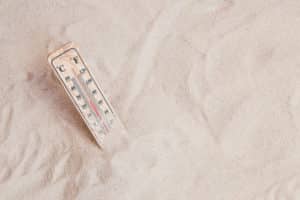There’s no hard and fast rule that answers the question “is your fridge cold enough” because it depends on the purpose of your refrigerator. Items like fresh fruit and vegetables can be stored at a warmer temperature, while dairy and frozen food needs to be kept colder.
In this blog, we will focus on a domestic fridge, however a lot of the information is transferrable across a broad range of situations.
What is the standard temperature of a fridge?
Generally you need to keep your refrigerator below 4 degrees Celsius but warmer than zero. Therefore, keeping your fridge set to around 2 or 3 degrees is perfect.
Cheese and butter can be kept at 8 degrees, beer at around 2 degrees, so you will need a happy medium.
3 degrees will mean that your fresh food doesn’t spoil due to being too warm, or freeze from being too cold.
Your crisper or chiller can be around zero while your freezer should sit at around -18 degrees to ensure that your food doesn’t thaw, and remains frozen.
How much energy does a fridge use?
Your fridge runs 24 hours a day, 7 days a week to keep your food at around 3 degrees Celsius, so you can imagine that it would consume a lot of energy, however, there are a few variables when it comes to working out how much power your fridge actually uses.
A smaller fridge of just 100L can use almost 360 kWh over a year, which is not much more than $100 a year, compared to a 700L fridge that can use almost 1360 kWh a year, or around $450.
If you are shopping for a new fridge, it’s good to note its star rating – the more stars, the more energy efficient to run all day, every day.
“My fridge isn’t working properly”
If you find yourself muttering those words, you’re probably correct! It’s rather easy to identify some issues with your fridge. Trouble signs include:
- Warmer or thawed food – It’s a little easier to notice when frozen food is no longer frozen. You might also notice your cold food being closer to room temperature, so you may feel inclined to adjust the temperature to be cooler.
- Increased energy bill – You might notice a spike in your power bill. If there’s no reason for it, and your food isn’t as cold as it should be, you might have a problem.
What next?
Nip any problem in the bud early to avoid costly loss of food, increased bills and even further damage to your fridge.
At John’s Refair, we have a response time of just 1 hour in emergency situations, and can often be at your home or work, ready to repair your fridge in 3 hours (to ensure we have all necessary parts and tools).
If you suspect any issues at all, make a call to John’s Refair on 9735 3958 your first step.
For more, visit our refrigeration services page.

